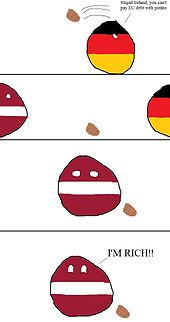Bikarhêner:Russavia/Polandball

Polandball, also known as countryball, is a user-generated internet meme which originated on the /int/ board of German imageboard Krautchan.net in the latter half of 2009. The meme is manifested in a large number of online comics, where countries are presented as spherical personas that interact in often broken English, poking fun at national stereotypes and international relations. The comics style may be referred to both as Polandball (even in case there is no Poland among the cartoon characters) and countryball (or, collectively, countryballs).
Background
[biguhêre | çavkaniyê biguhêre]Polandball has its roots in an August 2009 'cyberwar' between Polish Internet users and the rest of the world on drawball.com. The website, which offers a virtual canvas, allows Internet users to draw whatever they want, and to draw over others' drawings. On the Polish Internet, an idea was raised to draw the Polish flag on the ball, and thousands of Poles together managed to take over the drawball with a painting of white on top of red, with the word "POLSKA" written in the middle. After co-ordination from 4chan, this was then covered over by a giant swastika.[1][2]
Krautchan.net is a German-language imageboard whose /INT/ board is frequented by English-speaking netizens. The beginning of the Polandball meme is credited to Falco, a Brit on /INT/, who in September 2009 created the meme using MS Paint in an apolitical way to troll Wojak, a Pole on the same board who contributes in broken English, after which Polandball cartoons were enthusiastically drawn by Russians.[1][3][4]
Themes
[biguhêre | çavkaniyê biguhêre]
The premise of Polandball, which gained in popularity in the wake of the crash in Smolensk which killed Polish President Lech Kaczyński, is it represents Poland and its history, relations with other countries, and stereotypes,[3][5] focussing on Polish megalomania and national complexes.[2] Interactions between countryballs tend to be written in broken English and internet slang, reminiscent of the Lolcat meme, and by the end of the cartoon Poland, which is purposely represented as red on top of white (the reverse of the Polish flag), is typically seen weeping.[1][2]
Some Polandball comics arise from the premise that Russia can fly into space, whilst Poland can not. One of the most popular Polandball cartoons begins with the premise that Earth is going to be struck by a giant meteor, leading to all countries with space technology leaving Earth and going into orbit around the planet. At the end of the cartoon, Poland, still on earth, is crying, and in broken English pronounces the canonical Polandball catchphrase "Poland cannot into space".[3] In this humorous way, Russians put a halt to all discussion with Poles on which country is superior.[1][3][5] In another Polandball comic which delves into historic-political satire, Poland is seen to be boring other countryballs, with its proclamation of "So when we crushed Russia and the turks [sic] were were the biggest country in the world... and..", leading other countryballs to laugh at it. Poland, by now irritated, utters kurwa, and holds up a sign saying "Internet serious business", which is an internet slogan used to deride others who treat subjects with disdain, and in Polandball convention, finishes by crying.[1][2][6]
Other countryballs
[biguhêre | çavkaniyê biguhêre]
Polandball can also include comics on other countries, but by convention these comics are usually still referred to as Polandball,[1] although they can also be called countryballs.[4] According to Lurkmore.to, Bavaria has its own ball, and other balls have been created for U.S. states, Catalonia and Siberia, amongst others. Singapore takes the form of a triangle and is called Tringapore; Israel takes the form of a hypercube (in reference to Jewish physics); Kazakhstan takes the form of a brick; and Britain is shown wearing a top hat and monocle.[7]
References
[biguhêre | çavkaniyê biguhêre]- ^ a b c d e f Orliński, Wojciech (16 kanûna paşîn 2010). "Wyniosłe lol zaborców, czyli Polandball" (bi Polish). Gazeta Wyborcza. Roja gihiştinê 25 adar 2012.
{{cite news}}: CS1 maint: unrecognized language (lînk) - ^ a b c d Zapałowski, Radosław (15 sibat 2010). "Znowu lecą z nami w... kulki" (bi Polish). Cooltura. Roja gihiştinê 22 adar 2012.
{{cite news}}: CS1 maint: unrecognized language (lînk) - ^ a b c d Kapiszewski, Kuba (13/2010). "Fenomem - Polska nie umieć kosmos" (bi Polish). Przegląd. Roja gihiştinê 26 March 2012.
{{cite news}}: Nirxên tarîxê kontrol bike:|date=(alîkarî)CS1 maint: unrecognized language (lînk) - ^ a b "Polandball". Knowyourmeme. Roja gihiştinê 26
March 2012.
{{cite web}}: Nirxên tarîxê kontrol bike:|accessdate=(alîkarî); di|accessdate=de di cihê 3 de line feed character heye (alîkarî) - ^ a b Cegielski, Tomek (12 April
2011). "MEMY. Legendy Internetu" (bi Polish). Hiro.pl. Roja gihiştinê 24 March 2012.
{{cite news}}: Nirxên tarîxê kontrol bike:|date=(alîkarî); di|date=de di cihê 9 de line feed character heye (alîkarî)CS1 maint: unrecognized language (lînk) - ^ "Polandball cartoon". Unknown. Unknown. Roja gihiştinê 26 March 2012.
{{cite web}}: Nirxên tarîxê kontrol bike:|date=(alîkarî) - ^ "Int" (bi Russian). Lurkmore.to. 26 kanûna pêşîn 2011. Roja gihiştinê 27 adar 2012.
{{cite web}}: CS1 maint: unrecognized language (lînk)
